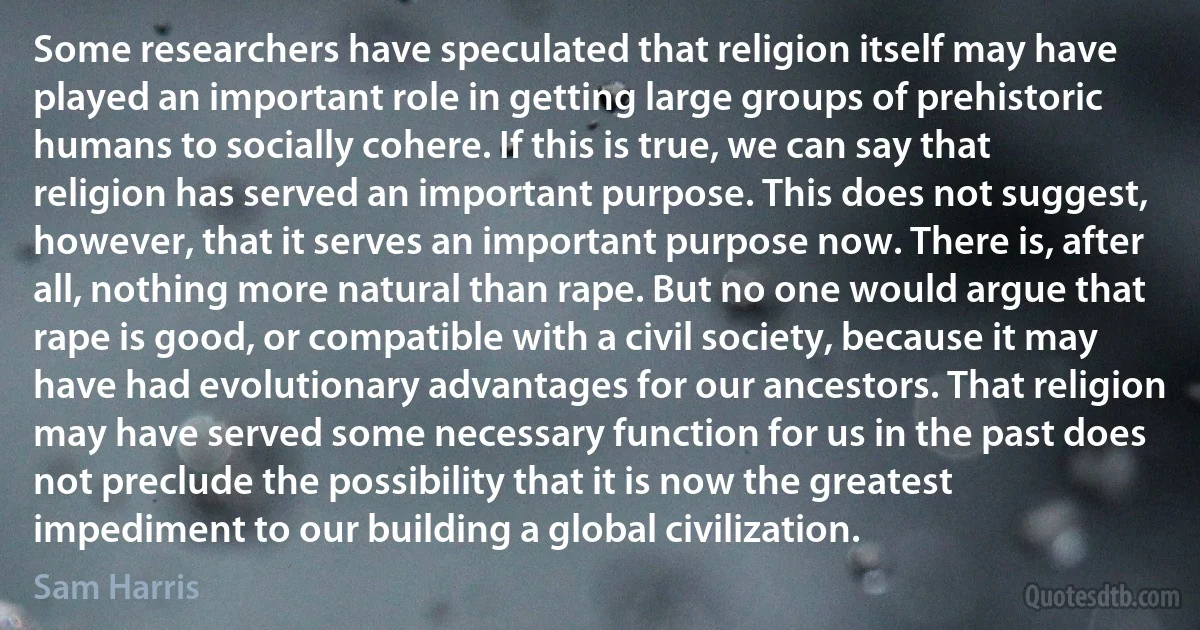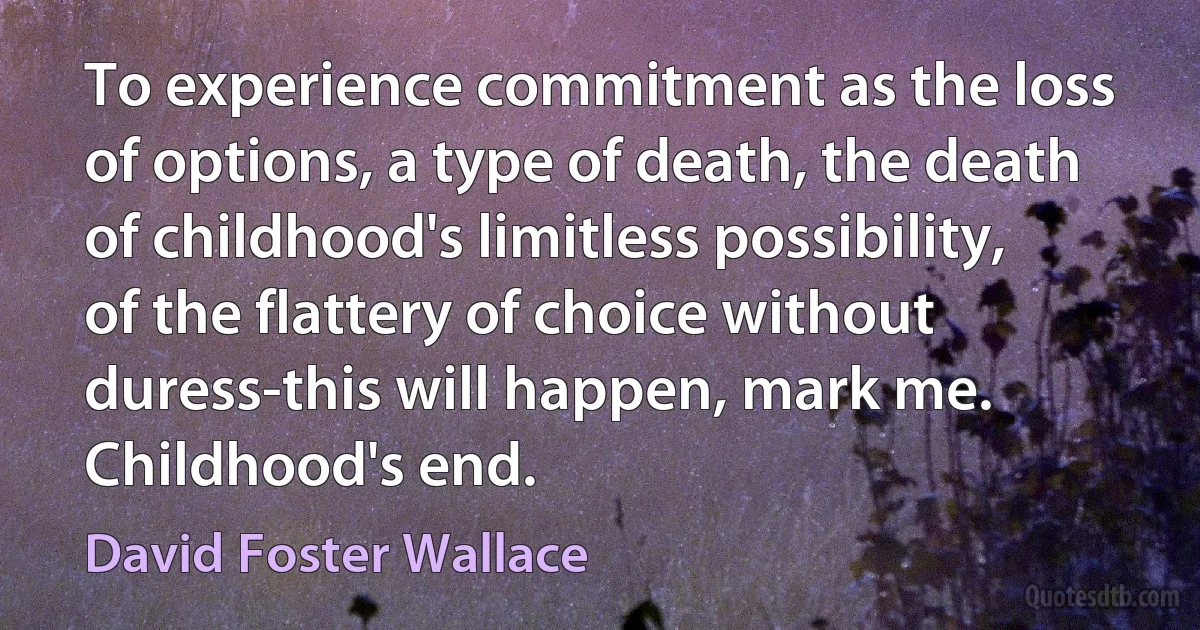Possibility Quotes - page 17
Let's just grant the possibility that there is a Creator God, who's omniscient, who occasionally authors books. And he's gonna give us a book – the most useful book. He's a loving God, he's a compassionate God, and he's gonna give us a guide to life. He's got a scribe, the scribe's gonna write it down. What's gonna be in that book? I mean just think of how good a book would be if it were authored by an omniscient deity. I mean, there is not a single line in the Bible or the Koran that could not have been authored by a first century person. There is not one reference to anything – there are pages and pages about how to sacrifice animals, and keep slaves, and who to kill and why. There's nothing about electricity, there's nothing about DNA, there's nothing about infectious disease, the principles of infectious disease. There's nothing particularly useful, and there's a lot of iron age barbarism in there, and superstition. This is not a candidate book.

Sam Harris
In secondary immigration, as I await processing, I sit with people for whom I imagine the experience is less of a novelty. To be blunt, non-white people. Mexican and Arabian people, mostly-I assume, I don't look at their passports; they don't have them, they're behind the desks with the border police, equally trapped and obese, behind the counter, often the same color as the people they're casually harassing. "Who does this notion of nation most suit,” I wonder as I sit there, unable to use my phone. Proper rich people don't encounter these rooms, these borders, these problems. For them the world is as it is when seen from space, without boundary, without limitation, full of fluid possibility and whispering wonder.

Russell Brand
It was in the attempt to ascertain the interrelationships between species that experiments n genetics were first made. The words "evolution" and "origin of species" are now so intimately associated with the name of Darwin that we are apt to forger that the idea of common descent had been prominent in the mnds of naturalists before he wrote, and that, for more than half a century, zealous investigators had been devoting themselves to the experimental study of that possibility. Prominent among this group of experimenters may be mentioned Koelreauter, John Hunter, Herbert Knight, Gartner, Jordan. Naudin, Godron, Lecoq, Wichura--men whose names are familiar to every reader of Animals and Plants unders Domestication.

William Bateson
He began to think about semblance, as Ansky had discussed it in his notebook, and he began to think about himself. He felt free, as he never had in his life, and although malnourished and weak, he also felt the strength to prolong as far as possible this impulse toward freedom, toward sovereignty. And yet the possibility that it was all nothing but semblance troubled him. Semblance was an occupying force of reality, he said to himself, even the most extreme, borderline reality. It lived in people's souls and their actions, in willpower and in pain, in the way memories and priorities were ordered. Semblance proliferated in the salons of the industrialists and in the underworld. It set the rules, it rebelled against its own rules...it set new rules.

Roberto Bolaño
To be able to key one sheet of a million before an operator in a second or two, with the possibility of then adding notes thereto, is suggestive in many ways. It might even be of use in libraries, but that is another story. At any rate, there are now some interesting combinations possible. One might, for example, speak to a microphone, in the manner described in connection with the speech-controlled typewriter, and thus make his selections. It would certainly beat the usual file clerk.

Vannevar Bush
The Chernobyl disaster, more than anything else, opened the possibility of much greater freedom of expression, to the point that the system as we knew it could no longer continue. It made absolutely clear how important it was to continue the policy of glasnost, and I must say that I started to think about time in terms of pre-Chernobyl and post-Chernobyl.

Mikhail Gorbachev
The dissolution of the Union radically changed the situation in Europe and the world, disrupted the geopolitical balance, and undermined the possibility of carrying further many positive processes that were under way in world politics by the end of 1991. I am convinced that the world today would be living more peacefully if the Soviet Union - of course in a renewed and reformed version - had continued to exist.

Mikhail Gorbachev
[The Constructive idea.. ] has revealed a universal law that the elements of a visual art such as lines, colours, shapes, possess their own forces of expression independent of any association with the external aspects of the world; that their life and action are self-conditioned psychological phenomena rooted in human nature; that those elements are not chosen by convention by any utilitarian or other reason as words and figures are, they are not merely abstract signs, but they are immediately and organically bound up with human emotions. The revelation of this fundamental law has opened up a vast field in art giving the possibility of expression to those human impulses and emotions which have been neglected.

Naum Gabo
Antoine Meillet also noted that imperatives in European languages are typically the morphological root of the verb, and hypothesised that the imperative was the primitive form of a verb: "walk!” precedes "to walk” or "he walks”. This opens up the possibility of an alternative ontology, or pre-ontology, based on commandment rather than assertion, on "be!” rather than "is”. While philosophical or scientific statements would fall under the ordinary "is”-based ontology, fields like law, religion or magic would operate in the imperative mode: "let there be...”.

Giorgio Agamben
If human beings were or had to be this or that substance, this or that destiny, no ethical experience would be possible... This does not mean, however, that humans are not, and do not have to be, something, that they are simply consigned to nothingness and therefore can freely decide whether to be or not to be, to adopt or not to adopt this or that destiny (nihilism and decisionism coincide at this point). There is in effect something that humans are and have to be, but this is not an essence nor properly a thing: It is the simple fact of one's own existence as possibility or potentiality.

Giorgio Agamben
All reality is a game. Physics at its most fundamental, the very fabric of our universe, results directly from the interaction of certain fairly simple rules, and chance; the same description may be applied to the best, most elegant and both intellectually and aesthetically satisfying games. By being unknowable, by resulting from events which, at the sub-atomic level, cannot be fully predicted, the future remains malleable, and retains the possibility of change, the hope of coming to prevail; victory, to use an unfashionable word. In this, the future is a game; time is one of its rules.

Iain Banks
This fallacious result is not... a peculiarity of classical mechanics; it is given also by a very wide class of possible systems of mechanics. This being so, no minor modification of the classical mechanics can possibly put things right. Something far more drastic is needed; we are called upon to surrender either the [1] continuity or the [2] causality of classical mechanics, or else the possibility of [3] representing changes by motions in time and space.

James Jeans
For, for aught we know, or for aught that the new science can say to the contrary, the gods which play the part of fate to the atoms of our brains may be our own minds. Through these atoms our minds may perchance affect the motions of our bodies and so the state of the world around us. To-day science can no longer shut the door on this possibility; she has no longer any unanswerable arguments to bring against our innate conviction of free-will. On the other hand, she gives no hint as to what absence of determinism or causation may mean. If we, and nature in general, do not respond in a unique way to external stimuli, what determines the course of events? If anything at all, we are thrown back on determinism and causation; if nothing at all, how can anything ever occur? As I see it, we are unlikely to reach any definite conclusions on these questions until we have a better understanding of the true nature of time.

James Jeans



